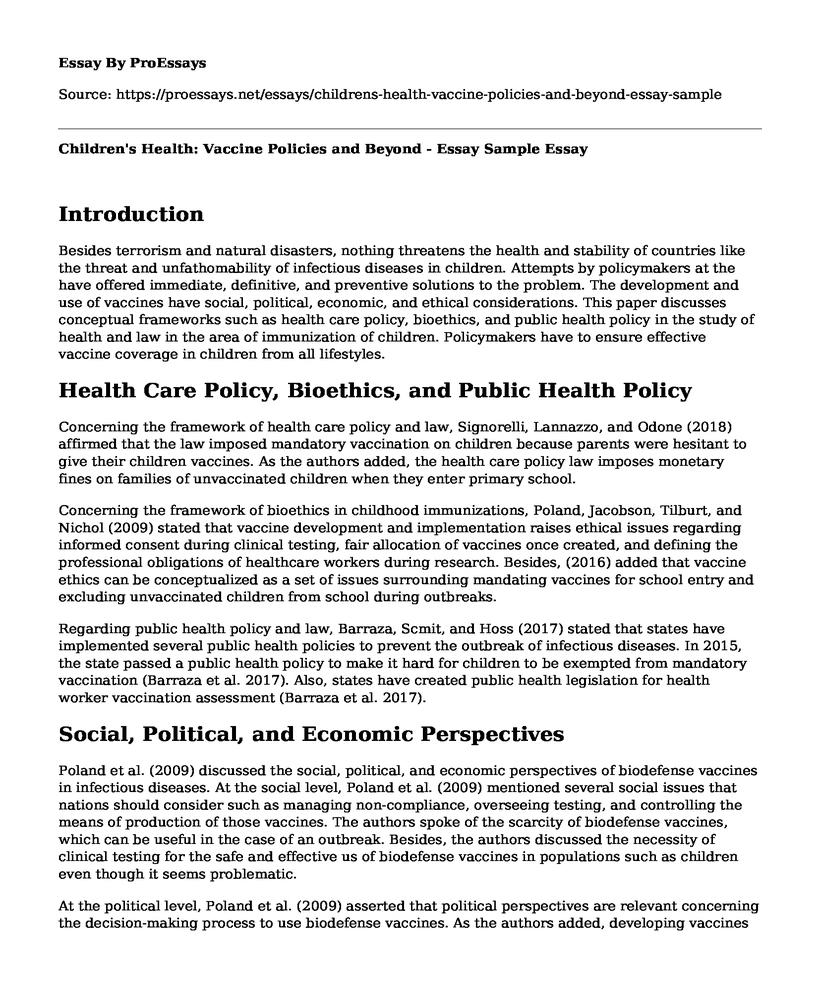Introduction
Besides terrorism and natural disasters, nothing threatens the health and stability of countries like the threat and unfathomability of infectious diseases in children. Attempts by policymakers at the have offered immediate, definitive, and preventive solutions to the problem. The development and use of vaccines have social, political, economic, and ethical considerations. This paper discusses conceptual frameworks such as health care policy, bioethics, and public health policy in the study of health and law in the area of immunization of children. Policymakers have to ensure effective vaccine coverage in children from all lifestyles.
Health Care Policy, Bioethics, and Public Health Policy
Concerning the framework of health care policy and law, Signorelli, Lannazzo, and Odone (2018) affirmed that the law imposed mandatory vaccination on children because parents were hesitant to give their children vaccines. As the authors added, the health care policy law imposes monetary fines on families of unvaccinated children when they enter primary school.
Concerning the framework of bioethics in childhood immunizations, Poland, Jacobson, Tilburt, and Nichol (2009) stated that vaccine development and implementation raises ethical issues regarding informed consent during clinical testing, fair allocation of vaccines once created, and defining the professional obligations of healthcare workers during research. Besides, (2016) added that vaccine ethics can be conceptualized as a set of issues surrounding mandating vaccines for school entry and excluding unvaccinated children from school during outbreaks.
Regarding public health policy and law, Barraza, Scmit, and Hoss (2017) stated that states have implemented several public health policies to prevent the outbreak of infectious diseases. In 2015, the state passed a public health policy to make it hard for children to be exempted from mandatory vaccination (Barraza et al. 2017). Also, states have created public health legislation for health worker vaccination assessment (Barraza et al. 2017).
Social, Political, and Economic Perspectives
Poland et al. (2009) discussed the social, political, and economic perspectives of biodefense vaccines in infectious diseases. At the social level, Poland et al. (2009) mentioned several social issues that nations should consider such as managing non-compliance, overseeing testing, and controlling the means of production of those vaccines. The authors spoke of the scarcity of biodefense vaccines, which can be useful in the case of an outbreak. Besides, the authors discussed the necessity of clinical testing for the safe and effective us of biodefense vaccines in populations such as children even though it seems problematic.
At the political level, Poland et al. (2009) asserted that political perspectives are relevant concerning the decision-making process to use biodefense vaccines. As the authors added, developing vaccines is expensive and funding such programs means averting funds from other needs, which eventually complicates the decision-making process.
At the economic level, Poland et al. (2009) stated that some of the economic challenges include the cost of vaccine production, product liability, and market size. The federal government in association with the Biomedical Advanced Research Development Authority (BARDA) and U.S. Department of Health and Human Services have spent millions of dollars in grants and contracts have not been sufficient enough to elevate the biodefense industry.
Key Stakeholders
Parents of Children who receive the Vaccines - cooperation from parents is important to ensure that their children receive the vaccines (Institute of Medicine, 2013).
Health care professionals who deliver Inoculations - effective communication with parents to cooperate to get their children to receive the vaccinations (Institute of Medicine, 2013)
Public health professionals who ensure vaccine delivery and Safety - they discuss with parents about their concerns such as the administration of individual vaccines rather than the entire schedule (Institute of Medicine, 2013).
Advocacy groups - their work is to help parents get information on the safety of vaccines and immunizations (Institute of Medicine, 2013)
The Federal government - their work is to provide parents with significant information on vaccines and immunizations (Institute of Medicine, 2013).
Conclusion
Overall, vaccination policies play a crucial role in protecting children's health through the prevention of infectious diseases. Over the years, the public health law has had tremendous achievement in the formation of policies for immunization in children. Parents should ensure that they vaccinate their children against the spread of infectious diseases to keep them safe in case of outbreaks.
References
Barraza, L., Schmit, C., & Hoss, A. (2017). The Latest in Vaccine Policies: Selected Issues in School Vaccinations, Healthcare Worker Vaccinations, and Pharmacist Vaccination Authority Laws. The Journal of law, medicine & ethics: a journal of the American Society of Law, Medicine & Ethics, 45 DOI:10.1177/1073110517703307
Hendrix, K. S., Sturm, L. A., Zimet, G. D., & Meslin, E. M. (2016). Ethics and Childhood Vaccination Policy in the United States. American journal of public health, 106(2), 273-278. doi:10.2105/AJPH.2015.302952
Institute of Medicine. (2013). 4 Stakeholder Concerns Related to the Safety of the Immunization Schedule. The Childhood Immunization Schedule and Safety: Stakeholder Concerns, Scientific Evidence, and Future Studies. Washington, DC: The National Academies Press. DOI: 10.17226/13563.
Poland, G. A., Jacobson, R. M., Tilburt, J., & Nichol, K. (2009). The social, political, ethical, and economic aspects of biodefense vaccines. Vaccine, 27. DOI:10.1016/j.vaccine.2009.08.054
Signorelli, C., Lannazzo, S., and Odone, A. (2018). The imperative of vaccination put into practice. The Lancet Infectious Diseases, vol.18, (Issue 1), pp.26-27. DOI: https://doi.org/10.1016/S1473-3099(17)30696-5
Cite this page
Children's Health: Vaccine Policies and Beyond - Essay Sample. (2023, Feb 27). Retrieved from https://proessays.net/essays/childrens-health-vaccine-policies-and-beyond-essay-sample
If you are the original author of this essay and no longer wish to have it published on the ProEssays website, please click below to request its removal:
- Collisions in Washington State Paper Example
- Paper Example on Handling Antibiotic Resistance
- Analysis of the Affordable Care Act - Essay Sample
- Essay Example on Nurse Practitioners: Promoting Good Health, Prevention & Better Care Outcomes
- Essay on Apicha Community Health Center: Providing Quality, Affordable Care to Vulnerable Communities
- Pulmonary Embolism: A Common Cause of Mortality in Hospitals - Research Paper
- Essay Example on Webinar Discussion: Improving Nursing Practice with Lawrence Bryant







